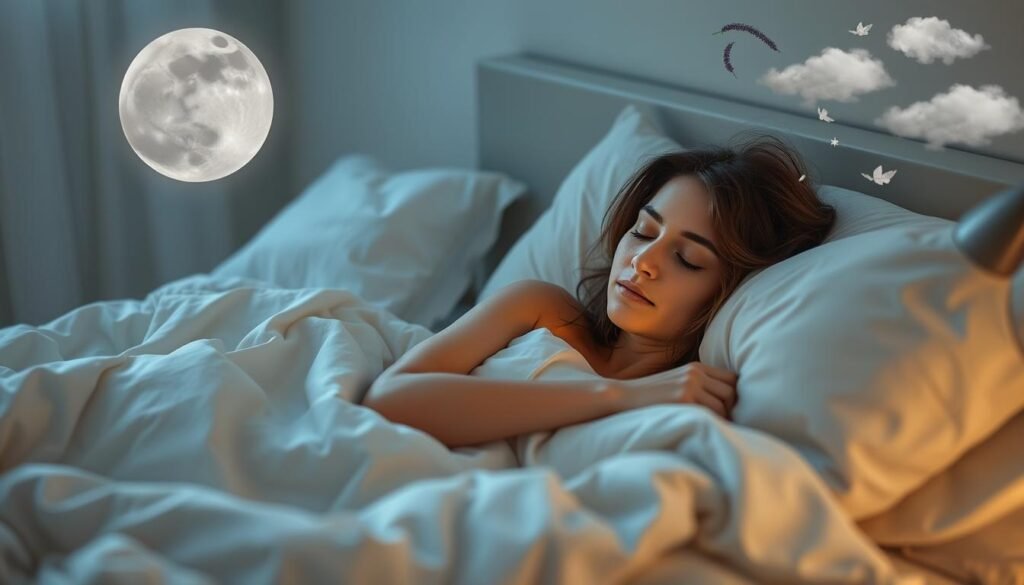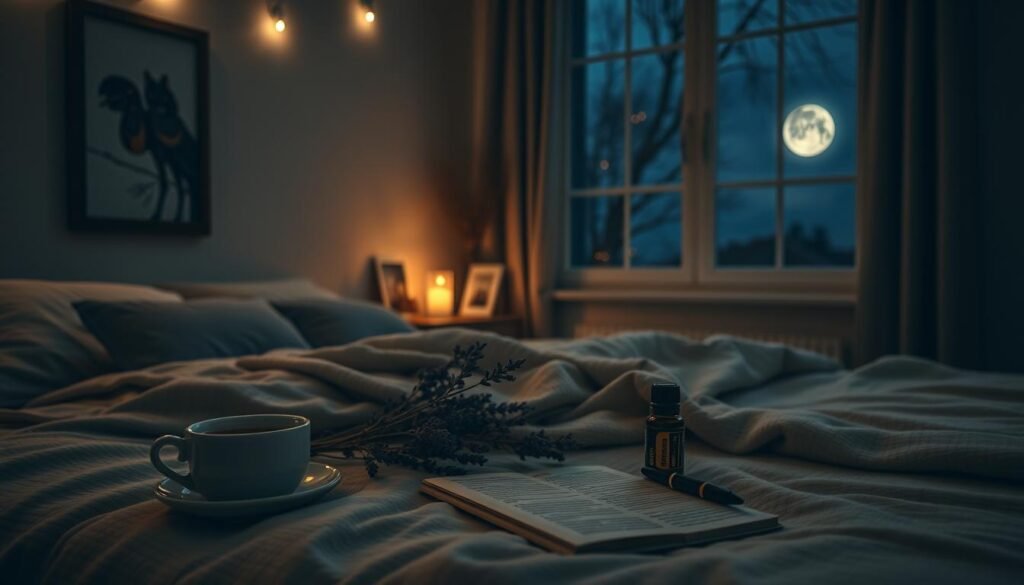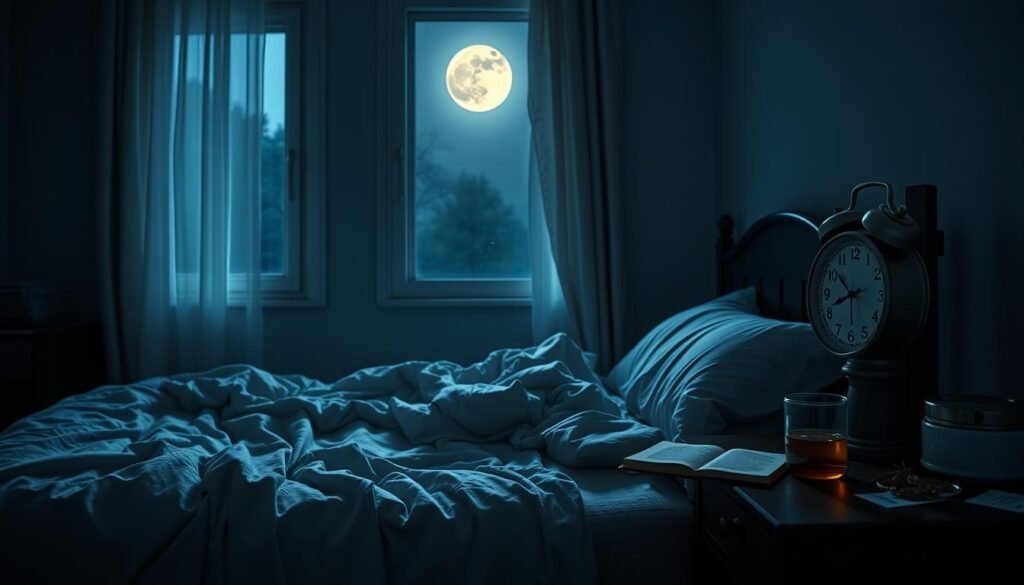About 60% of women going through menopause struggle with insomnia. This is a key issue during this big change in their lives. The main reasons include hormonal changes, stress, and changes in lifestyle. It’s important to understand these causes to better manage the effects of menopause insomnia.
During perimenopause and menopause, sleep issues become more common. Hot flashes, night sweats, and mood changes all mix together, leading to trouble sleeping. Many women notice their sleep problems begin in perimenopause and last even after menopause ends.
A whopping 61% of women say hot flashes make it hard to sleep. Recognizing these triggers is key. For more info, see this insomnia guide. It provides tips on how to manage these issues effectively.
Underneath those sleepless nights are changes in hormones like estrogen and progesterone. They help control sleep quality. As these hormones decrease, sleep may get worse. Tackling these menopause sleep issues is vital for better rest.
Key Takeaways
- Approximately 60% of menopausal women experience insomnia.
- Hormonal fluctuations significantly contribute to sleep disturbances during menopause.
- Hot flashes are reported as a major factor in menopause-related sleep issues.
- Insomnia often begins during perimenopause and can continue post-menopause.
- Understanding the triggers of insomnia is crucial for effective management.
Understanding Menopause and Its Phases
Menopause is a natural process with three phases: perimenopause, menopause, and postmenopause. Each phase has unique experiences and challenges. Perimenopause starts around age 47. It features changing hormone levels and less regular periods. This stage brings mood swings, hot flashes, and sleep issues. Studies show 40-60% of women in this phase struggle with sleep.
In perimenopause, hormonal changes increase the risk of insomnia. Research shows peri-menopausal women are 1.6 times more likely to have sleep problems than before menopause. After menopause, women face sleep issues 1.67 times more often than pre-menopausal women.
Knowing about menopause phases helps us understand symptoms like hot flashes and mood changes. This knowledge leads to better handling of these symptoms. It also underlines the need to address sleep problems for a better life. For tips on managing hormonal effects on sleep, here’s a helpful resource.
What Causes Menopause Insomnia
Menopause triggers many changes that upset sleep patterns. Hormone changes are very important during this time. They lead to insomnia as estrogen and progesterone levels drop, making good sleep hard to come by.
Hormone Fluctuations and Sleep Issues
Hormonal shifts during menopause disturb sleep. When estrogen and progesterone levels fall, sleep quality suffers. These hormones help manage sleep cycles. Changes in their levels can bring on hot flashes at night, causing frequent wake-ups. About half of the people going through menopause report sleep problems, linking hormone shifts directly to insomnia.
Impact of Perimenopause on Sleep Patterns
In perimenopause, the phase before menopause, irregular hormone cycles disrupt sleep even more. Research shows up to 47% of women in this stage have trouble sleeping. The mix of changing hormones, emotional stress, and symptoms like hot flashes challenges sleep. These hot flashes can last 2 to 4 minutes, increasing in frequency up to postmenopause. Sleep apnea, affecting around 25% in premenopause, also hurts sleep quality.
| Stage | Prevalence of Sleep Disturbance |
|---|---|
| Premenopausal | 16% – 42% |
| Perimenopausal | 39% – 47% |
| Postmenopausal | 35% – 60% |
Anxiety and mood swings are common, linked to hormone shifts. This shows how crucial it is to understand the link between hormones and sleep. As you go through menopause, tackling these issues is key to better sleep and well-being.
Common Symptoms Accompanying Menopause
Menopause can bring many changes that affect your wellbeing. Sleep quality often suffers due to symptoms like hot flashes and night sweats. These, along with increased stress and anxiety, make restful sleep hard to come by.
Hot Flashes and Night Sweats
A large number of women experience hot flashes during menopause. Between 75% and 85% of women feel this sudden warmth, often with sweating. Night sweats are hot flashes that hit during sleep. They can wake you up often and shorten your sleep time. This makes it tough to feel refreshed in the morning.
Emotional Changes: Stress and Anxiety
Menopause is more than physical changes; it affects your emotions too. Many women face more stress and anxiety during this time. This can harm both mental health and sleep. Studies link these emotional issues to sleeping problems in women after menopause. They can even make insomnia worse, adding to menopause’s challenges.
| Symptoms | Impact on Sleep | Prevalence |
|---|---|---|
| Hot Flashes | Frequent awakenings, difficulty falling back asleep | 75% to 85% of postmenopausal women |
| Night Sweats | Disruption of sleep cycles, poor sleep quality | Common in many menopausal women |
| Stress & Anxiety | Difficulty focusing, increased insomnia | Heightened in menopausal women |
How Hormone Changes Affect Sleep Quality
During menopause, the link between hormone changes and sleep is key. Estrogen and progesterone are important for sleep. Their drop can lead to poor sleep, causing issues like insomnia.
Effects of Estrogen and Progesterone
Estrogen affects mood and energy and helps with sleep. As it decreases, women may face hot flashes and night sweats. Progesterone, on the other hand, helps you sleep. But, when these hormones change, so does sleep quality. Around 40% to 60% of women in menopause have sleep problems.
Impact of Decreasing Hormone Levels
Lower hormone levels can make insomnia more common in menopause. Women might also deal with more anxiety and stress, hurting sleep quality.
Melatonin levels drop with age, making sleep harder. Stress hormones like cortisol can also disrupt sleep. Getting help through treatment or lifestyle changes can improve sleep. For more info on hormones and sleep, see this resource.

| Stage of Menopause | Percentage Experiencing Sleep Issues |
|---|---|
| Premenopause | 16–42% |
| Perimenopause | 39–47% |
| Postmenopause | 35–60% |
Sleep Disturbances Linked to Menopause
Menopause brings major sleep disturbances for many women. This affects their life quality deeply. About 40% to 60% of women struggle with insomnia during this time.
The decrease in estrogen plays a big role in these issues. Insomnia becomes a common problem. In fact, the risk of experiencing insomnia jumps by 50%.
Common Sleep Disorders in Menopausal Women
Insomnia isn’t the only sleep issue for women in menopause. Over half report problems such as restless legs syndrome. Nighttime hot flashes disrupt sleep too.
They often wake women up just before the heat rises. Bad sleep can lead to depression and more anxiety during menopause.
Sleep Apnea: A Hidden Concern
Sleep apnea is much more common in women after menopause. They are two to three times more likely to have it than before menopause. The reason? They lose hormone protection against sleep problems.
This issue, combined with aging, makes sleep harder. Sleep apnea often stays undiagnosed in these women. Treating it is key to better sleep and health.
For more insights on sleep disturbances in menopause, visit this resource.
The Role of Lifestyle Factors in Insomnia
Looking at lifestyle choices is key in managing menopause-related insomnia. This includes nutrition and sleep habits. Improving these can help women during this time find better sleep.
Nutrition and Its Impact on Sleep
Eating right is crucial for good sleep. For menopausal women, what they eat can really affect their sleep. Foods rich in magnesium and tryptophan like nuts, seeds, and turkey, are good for sleep. Also, eating fruits, vegetables, whole grains, and lean proteins can lessen hot flashes. This makes sleeping easier.
Staying hydrated is also important. Drinking enough water during the day can stop you from waking up thirsty. Understanding how nutrition and sleep work together is key to beating menopause insomnia.
Physical Activity: Benefits for Sleep Quality
Being active is great for sleep. Doing exercises like walking or swimming helps with sleep. It cuts down on insomnia by easing anxiety and stress. It helps keep hormone levels in check, which can affect sleep.
Even light activities like yoga help with sleep. Starting a routine with some exercise can improve sleep. This is vital for dealing with menopause insomnia.
Methods for Managing Menopause Insomnia
There are various ways to tackle insomnia during menopause. These include improving sleep habits and both medical and behavioral techniques. Making your sleep space comfortable is key. For severe symptoms, medications might also help.
Behavioral Techniques and Sleep Hygiene
Good sleep practices can really help. Try sticking to a regular sleep schedule. Make your bedroom quiet and dark. Avoid caffeine and nicotine before bed. Relaxation exercises, like deep breathing or meditation, are also effective.
A study showed cognitive behavioral therapy (CBT) helps reduce insomnia in menopausal women. In research with 106 women, those receiving CBT over the phone slept better and felt better overall.
Medication Options to Consider
When behavior changes aren’t enough, medication might be necessary. There are several medicines to consider:
| Medication | Type | Effectiveness | Potential Side Effects |
|---|---|---|---|
| Fluoxetine (Prozac) | SSRI | Relieves hot flashes and improves sleep | May cause nausea or insomnia |
| Paroxetine (Brisdelle) | SSRI | Effective for both mood and sleep disturbances | Possible fatigue and weakness |
| Gabapentin (Neurontin) | Neuropathic agent | Improves sleep quality | Dizziness and drowsiness |
| Bazedoxifene (Duavee) | Estrogen agonist | Increases sleep quality | Potential for headache and stomach upset |
| Zolpidem | Sedative-hypnotic | Effective for short-term sleep issues | May cause dizziness, coordination problems |
It’s important to talk to a healthcare provider to find the best medication. Each medicine has its own pros and cons and should fit into your overall health plan.
Natural Remedies for Better Sleep
Many menopausal women struggle with insomnia. About 40-60% have sleep problems during this change. Natural remedies, like herbal supplements and relaxation techniques, can help. They may improve sleep quality.
Herbal Remedies and Supplements
Some herbal supplements are known for aiding better sleep. Valerian root and melatonin are top picks. Melatonin helps as it decreases with age. A dose of 0.3 to 3 mg/day is recommended. This helps menopausal women sleep better.
Other important herbal supplements include:
- 5-Hydroxytryptophan (5-HTP): Doses range from 300 to 500 mg to improve sleep duration and quality.
- Ashwagandha: Advised dosage is between 500 to 2000 mg before bedtime.
- Magnolia bark extract: Good for insomnia symptoms, often paired with magnesium.
- Hops: Showed better hot flash scores with doses of 100 to 250 mcg over 12 weeks.
These supplements aid in relaxation, which may help with menopause symptoms like anxiety and mood changes.
Relaxation Techniques for Improved Sleep
Adding relaxation practices to your daily life can improve sleep. Yoga and meditation reduce stress, helping to fight insomnia. Below are some ways to relax more:
- Yoga: Regular practice can lessen stress and enhance sleep quality.
- Meditation: Mindfulness meditation helps calm the mind, making sleep easier.
- Deep breathing exercises: This simple method can decrease nighttime anxiety.
Combining natural remedies with relaxation methods can help menopausal women. It’s a holistic way to tackle sleep problems and boost well-being.

The Importance of Seeking Professional Help
Menopause brings many challenges, including sleep problems that impact daily life. Over 60% of women experience sleep issues during menopause, as noted by the British Menopause Society. It’s crucial to seek professional help when sleep disturbances harm wellbeing and daily activities.
When to Talk to a Healthcare Provider
Consulting a healthcare provider is wise if you have persistent insomnia. Signs include:
- Severe sleep disruptions lasting several weeks.
- Daytime fatigue or irritability that affects daily tasks.
- Problems with concentration or memory due to poor sleep.
- Anxiety or mood changes that worsen without enough sleep.
Understanding Treatment Options
Getting expert advice helps manage treatment options for insomnia based on individual needs. The options include:
| Treatment Option | Description | Benefits |
|---|---|---|
| Cognitive-Behavioral Therapy | A structured program aimed at changing sleep-related thoughts and behaviors. | Long-lasting improvement in sleep quality. |
| Hormone Replacement Therapy | Therapy to alleviate hormonal imbalances during menopause. | Reduces hot flashes, night sweats, and improves sleep patterns. |
| Medications | Prescription sleeping pills or other medicines for sleep issues. | Offers quick relief for severe insomnia, but may have side effects. |
Lifestyle changes can also enhance sleep quality. These include a healthy diet, regular sleep schedules, and frequent exercise. With proper support, women can tackle sleep problems during menopause more effectively. For additional tips, check out this useful resource.
Women’s Experience: Personal Stories and Insights
Menopause is a journey of both body and mind, affecting sleep deeply. Many share their stories, showing how insomnia shakes their lives. Around 25% of women in menopause battle true insomnia, sparking talks on how to cope and find support.
A survey shows 40% to 60% of women in this phase struggle with sleep. They often turn to loved ones for help, rather than doctors alone. These stories underline the need for understanding and support, beyond just medical care.
Getting to sleep becomes harder post-menopause, taking over 30 minutes more. Many women deal with sleep-onset insomnia, impacting their daily happiness. By sharing, they build a community and reduce the stigma of talking about menopause.

Speaking up about menopause symptoms is often hard. A lot of women aren’t aware of how hormone therapy could help. This lack of knowledge makes some see menopause as just aging, missing out on active health management. Their stories suggest we need more education and support on menopause and insomnia.
| Key Insights | Statistics |
|---|---|
| Percentage of menopausal women reporting poor sleep quality | 40% – 60% |
| Percentage of women meeting insomnia disorder criteria | 25% |
| Time taken by post-menopausal women to fall asleep | 30+ minutes longer |
| Percentage preferring informal support | Varies (many women) |
| Percentage who have never discussed symptoms with a doctor | 45% |
Sharing these stories shines a light on the need for open talks about menopause and insomnia. Hearing from others validates personal experiences and sparks hope for better solutions together.
Conclusion
The road through menopause brings sleep challenges. A look at menopause insomnia shows 40-60% of women face sleep issues. 26% might even get an insomnia disorder diagnosis. These problems cause lots of awake time and cut sleep by 43.5 minutes.
Hormonal and emotional shifts play a big role in menopause insomnia. Women with sleep troubles should try the tips we talked about. Changes in diet and more exercise can help a lot.
Don’t forget the value of expert advice for better sleep. There’s hope for deeper rest, easing menopause’s impact. Millions of women deal with this every year, showing the big need for support.